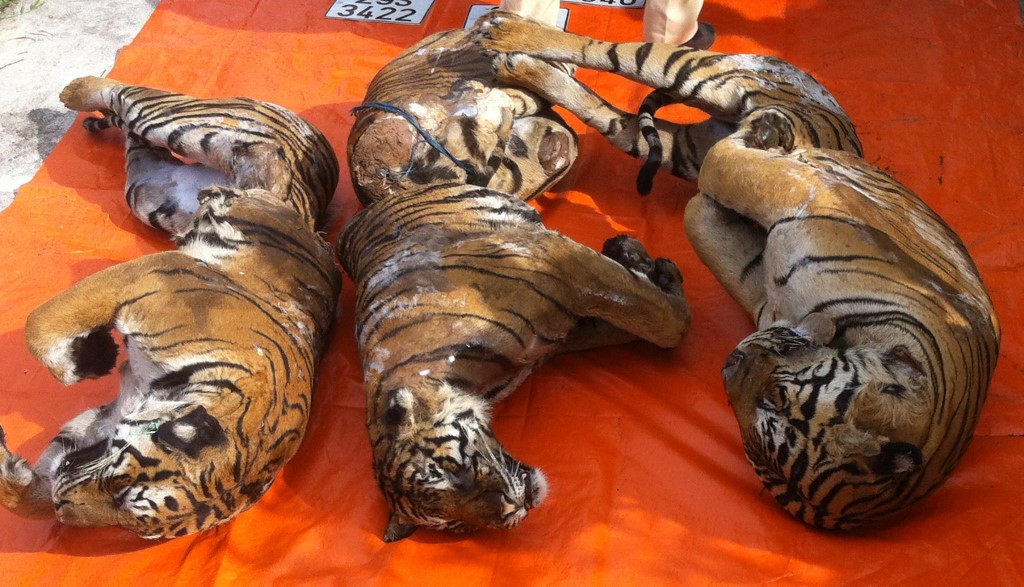Reporters from NTNN/Dan Viet have infiltrated and investigated tiger breeding and trading networks across Vietnam and other involved countries. Here are the results. Warning: Graphic images
Part 1: Confronting an online tiger trade “kingpin”
Just scroll on social media and type in a few keywords and you’ll see numerous ads for every rare and precious animal imaginable. From snakes, pangolins, and wildcats, to designated “rulers of the mountains and forests” such as tigers, elephants, rhinos and lions.
We started our investigation on these platforms. From searching around on social media, we got ahold of the phone number of a self-proclaimed professional seller of tigers and tiger products living in Dien Chau district, Nghe An province.
They told us through a call: “Rhino horn, ivory, just name it and I’ve got supplies for you. Tiger and leopard bone glue is on a higher level. I’ll send you pictures through Zalo, we have butchered and live tigers. If you want to cook the bones down yourself, I’ll send people over to your place to do it for you. I have bones of every animal you could ever want.”
On YouTube, there is an abundance of distasteful videos and channels dedicated to content involving killing tigers, cooking bone glue, or advertising tiger products. One seller, who we’ll call Q, has a YouTube channel which regularly uploads videos selling tiger products at “black market prices”, such as 3.5 million dong ($152) for a tiger claw or 10 million dong for a tiger fang.

Not only tigers but other rare wild animals are also being blatantly sold and advertised on these platforms. Q also promotes similar images and videos on his Zalo account.
Q reassures his customers of his business ethics: “The customer’s trust comes first”, “customers can feel secure transferring their money before receiving their order”, or “I offer shipping, please check if you’ve received the correct order before paying”. Notably, Q’s profiles have acquired thousands of followers.
Another social media account takes pride in posting numerous pictures of dead, skinned and butchered tigers dangling from hanging racks like pigs in professional slaughterhouses. In addition, the account owner also posts pictures, or even videos, of the bloody butchering process to gain confidence from potential customers.
Tiger bone glue batches are recorded and live-streamed for customers to see. Baskets of tiger bones are cooked down to a “glue” and cut up into pieces filling up trays upon trays.
After a bit of digging around on these social media accounts, we found a way to meet up with some “big shots” in the market of tiger products, including T – a “kingpin” in Ho Chi Minh City, who is making a fortune selling these products nationally just through social media.
“Epic” marketing
Posing as customers who are willing to pay big money for large quantities of the products, after many attempts, we finally got in contact with Kingpin T. He eagerly told us through calls and texts: “I’ll charge you 8 million dong for the whole jug of the wildcat wine, that’s a fair price. I’m fine with 70-80 million for the baby tiger. I can guarantee you the tiger bone wine is the ‘first brew’. The tiger I left in Long An, the bear paws and lynxes are at my place. I brought this specific tiger all the way from Laos.”

“I have one tiger paw left, a hundred something million for that one. There’s also only one tiger wine and two bear paws in stock. Come visit us, I’ll treat you to any liquor you want: tiger bone, rhino horn or lion bone.”
After browsing his inventory, we came up with excuses to not pick our goods up right away and left Kingpin T’s place. When we were saying our goodbyes, T advised us: “Some ballers also came to see the goods today. Just say the word and I’ll ship them to you, but if you don’t make a decision soon enough, they’ll sell out any second.”
Before beginning our trip to Long An province, Kingpin T brought us to his private property in District 6, Ho Chi Minh City, to see his pitchers of tiger, lynx and cobra wine
After his sales pitch and likely a thorough examination of our background, Kingpin T drove to Tan Son Nhat airport to meet up with a wealthier group. T enthusiastically offered upon meeting these ballers: “Don’t worry, trust us. Whatever you’re buying I’ll have people ship right to your doorstep, and all our goods are of premium quality.”
Before beginning our trip to Long An province, Kingpin T brought us to his private property in District 6, Ho Chi Minh City, to see his pitchers of tiger, lynx and cobra wine. He revealed: “I imported these from Laos and Cambodia. They prepped everything before transport, otherwise it’d be too risky transporting live animals. If there’s an order for a live animal, I’ll have to make sure if the person is genuinely willing to spend big money because the cost would go through the roof.”
From what we observed, other than the tigers and lynxes Kingpin T had in his wine jugs, there were countless king cobras weighing around 10kg, curled up in the liquor. Bigger jugs can hold cobras weighing up to 20kg, and each of them would sell for more than 30 million dong.
Kingpin T says peak periods of snake wine sales are usually at the end of the year when wealthy businessmen and bureaucrats need gifts for their bosses and colleagues. We pretended that the snake wines didn’t live up to our standards and were pointed to the tiger and lynx wines.
Fishing the lynx and baby tiger out of the wine, Kingpin T said: “88 million for the tiger, 10 million for the lynx,” and quickly sealed the jugs close. “You can’t let too many people learn about these forbidden goods, it’s too risky,” T candidly explained.
“It’s not an easy job I’m doing, but luckily I’ve never been caught. Go ahead and consider your purchase, but you can definitely trust me.”
After the home visit in Ho Chi Minh city, Kingpin T and our team drove 60km to Long An. On the road, our conversation stayed on the topic of animal wines and its rumoured benefits.
We reached one of Kingpin T’s warehouses after an hour of driving and saw a large tiger in a wine jug. Kingpin T claimed that the animal cost 2 billion dong. We were expressing concern about the long South-North transporting process when he immediately reassured us.
“If you do decide to purchase, it’s my responsibility to safely transport the goods to your home. You just have to pay a deposit; I’ll only charge you the rest when you receive your order. If you don’t have ‘leads’ like mine for these goods, you’ll never get them to Hanoi. This tiger was untouched, blood was coursing through its veins and its whiskers still attached when we soaked it.”
“Any shipping destination is possible,” Kingpin T continued. “I’d package it up with Styrofoam cushioning and leave it to my regular drivers. My buddies work in legal stuff too … If you’re taking three tigers, I’ll drive them out to you myself. You can just transfer me the money.”

After the encounter with Kingpin T, reporters at NTNN/Dan Viet went on to set up meetings with another big shot in the business, “Tiger T” – a 40-something-year-old woman from Thai Nguyen. She couldn’t hide how proud she was when she told us she had cooked down hundreds of tigers.
Spending 40-50 billion dong in stock orders
In late December 2019, we got in contact with Tiger T through a connection and told her we were looking for tiger bone glue to strengthen “diplomatic relations” with our boss. After a long session of asking questions and getting to know more about us, Tiger T finally accepted our meeting invitation. She wanted us to meet at a quiet place in the centre of Cao Bang City to discuss business.
Having listened to our request at the meeting, T offered, “If you guys definitely want a whole tiger cooked down, I’ll carry the big cat to wherever is most convenient for you. Your boss can come for a tour of the process, and it’d be even better if your people want to oversee the bone glue cooking 24 hours a day.”
According to Tiger T, “a standard bone glue batch takes six days to cook. The customer would keep the keys to open the cooking pot and may have someone oversee the cooking process 24 hours a day.”
She continued the conversation with the unyielding attitude of a boss in the world of tiger bone trading. We were taken back to our hotel in her luxurious car – she might have made the kind offer to discreetly examine us further.
In the conversation, we pretended to be hesitant about the price and the tiger quality due to the high prices given to us from other sellers and ambiguous charging methods. Tiger T quickly reassured us: “I use the animal’s live weight as opposed to the carcass weight when it’s butchered to determine how much we’re going to charge for its bone glue. You don’t have to worry about that. I’ll take care of it for you, properly at that.
“I only sell male tigers that are slightly thin. I never pick tigers from Malaysia or Africa, they’re full of crap! There aren’t any ‘good’ tigers there. But I’ll be honest, my stock comes from enclosed farming [in safaris and big farms]. I don’t have wild tigers; there are just no tigers living in the wild anymore.”

Tiger T also insisted that we’d get the best bone glue if we used a frozen tiger. We pretended to be looking for a live tiger, however. Tiger T insisted: “I have those too, but most of them are bred in Laos. The Laotians let them live and hunt in their natural habitat 70% of the time, in the other 30% they’re fed in farms. They’re kept semi-wild. I’ll get you a whole tiger, alive and all. We’ll only electrocute it when you arrive, then we’ll butcher it for you too. Tiger meat is just scrumptious!”
Tiger T continued her sales pitch while smacking her lips. “There’s a secret to our selection process. Tigers with lifestyles closer to wild ones’ have denser claws and teeth, and their kneecaps and ‘phoenix eyes’ [a small round hole on the kneecap] are all intact. My people will butcher the big cat. You keep the most precious parts – the kneecaps – and add them to the bone pot later.”

Tiger T also revealed that she, as well as her partners, would spend upfront tens of billions of dong on each batch of up to a hundred tigers.
“The tigers are not ready for sale until a set period of time in the year, that’s why we usually have to buy them all for our stock, even if that means 50 or a hundred of them, and have them ‘stored’ at the farm while we’re gradually selling them. There have been times when we spent 40-50 billion on stock orders,” she told us.
Tiger T warned us that the products would cost much more nowadays – the fewer you buy the more expensive they would be – because there had just been five traders like her who were arrested, one right after the other. Moreover, she claimed to only sell “Indochinese tigers”, hence the high price tag that came with the quality.
“I wouldn’t sell fully farmed tigers – that kind of business would destroy my credentials,” she asserted. “We can cook the tiger bone glue anywhere you want.”
We tried to express confidence in our potential “business partner” and asked T for further information on the payment method and secure locations for the bone glue cooking process.
T replied: “We’ll take care of the transporting. I’ll take the goods to a safe location, if anything happens there, that’s on you.”
It’s an honest business I’m doing. I’m not profiting much from this at all; we’re only working from the heart. We have to keep the quality of our products high so the customers would return
She went on to discuss where to securely cook the bones and told us we could pick the location ourselves. “I’ll get everything done and wrapped up in one night. All you have to do is sit around and wait for my call. 63 provinces in Vietnam, we can cook the glue anywhere you want. People have learned my name; I’m a trustworthy businesswoman.”
Illegal tiger trading is a complex national market in Vietnam. We carried out a private investigation process and found out that Tiger T and her network has been trafficking tigers for well over ten years. With a decade of experience under her belt, she never strays from strict principals to make sure she is conducting business with the highest level of security.
She always considers first and foremost the safest location to kill the tigers or hand over the animal and its bones to her customers – somewhere Tiger T and her accomplices could have complete control over. It would usually be a place which has little to no risk of ever getting spot-checked. Her key principal goes: “The best location is at a lamppost”.

Moreover, when the goods arrive at their destination per the customers’ request, both sides would try to use up and dispose of every last piece of bone. Tiger T knew too well that if the authorities arrest her for tiger trafficking, they won’t be able to press charges unless there is sufficient evidence of the animal’s head, teeth, flesh and skin.
Demand-side stimulus package: Purchasing a quarter of the customer’s bone glue
Tiger T also made her personal business process clear: “If you’re buying a live tiger, you’ll have to pay me 50% of the money. The rest you can give me when we finish cooking the bone glue.”
Besides the shipping, bone glue cooking, and at-home butchering, T also offered another unique “service”: supporting the customers by purchasing a quarter of the bone glue made from the tiger that she supplied.
“I always tell my customers: either we don’t cook anything at all, or let’s just cook a whole 250-300 kilo tiger. It’d cost at least 1,65 billion dong. Now of course, most customers want full control over the tiger – from when it’s a live animal to when it’s a pot of bone glue. However, they usually don’t have enough money to pay for the whole batch or they just don’t need all the glue. In that case, I have their backs: I’d purchase from them a quarter of the bone glue from that tiger,” Tiger T smirked.
“It might be best that you have the bones cooked at my place. I’ll cover everything: it’s on me if something gets lost, or if ‘the law’ gets involved, you won’t have anything to do with it. Just have your people come and oversee the bone pot. In this case, I’ll charge you 5,5 million for every kilogram that the live tiger weighs,” she offered.
“It’s an honest business I’m doing. I’m not profiting much from this at all; we’re only working from the heart. We have to keep the quality of our products high so the customers would return.”
Demonstrating her experience in the industry, T continued:
“I’ve been doing this for 10 years now. You can tell from that alone that I have established a huge trading network. When transporting live tigers, we have to give them enough anaesthetic to put them under for the whole drive to the destination. They’ll growl too much if they wake up prematurely and that will ruin everything.
“We make everyone involved sign papers and take personal responsibility for their part in the process. For example, if the shipping van is stuck in traffic and the tiger wakes up and starts growling, the people who are responsible for the anaesthetic and the transporting will handle the consequences.”
This is part one and two of a five-part series. This article was originally published in Vietnamese on Dan Viet here and here and translated into English for the Globe with the permission of the authors. It was the first place winner in the VIEWS journalism awards by CHANGE NGO.


